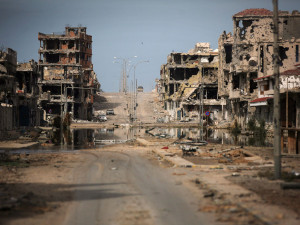
“Libyans enjoyed the highest living standard on the Continent. Gaddafi did not stay on top for 42 years without ensuring that his population has little room to complain. Most health services, education and fuel was state-subsidized. Gaddafi’s Libya had the lowest infant mortality rate and life expectancy of all Africa. When he seized power from the ailing King Idris four decades ago, literacy was below 10% of the population. Today it is above 90%, hardly the footprint of your typical tyrant. Less than 5% of the population is undernourished, a figure lower than the United States. In response to the rising food prices of recent months, Gaddafi took care to abolish all taxes on food. And a lower percentage of the population was living below the poverty line than in the Netherlands.” (Engdahl, 2012, p. 220)
Today, Libya is a balkanised nation that has been “split into three parts” following NATO’s intervention in 2011, with Cyrenaica comprising the East of the country, and the West split into Tripolitania in the Northwest and Fezzan in the Southwest. The nation is now a failed state which is devoid of central government and is stricken by tribal warfare, where rival militias who were once fighting alongside each other are now battling against one another. Many of the rebels who fought – with the assistance of the CIA and MI6 – to overthrow Gaddafi, have also made their way across the Middle East to fight alongside the Syrian rebels in the proxy war against Bashar al-Assad.
The country has been in such a state of turmoil since 2011 that oil production has been low and inconsistent, with rival militias vying for control over the nation’s natural resources. This may lead to the CIA propping up General Khalifa Hifter as a new puppet leader to ensure enough stability for Big Oil to rape the resources of a country which is home to Africa’s largest oil reserves. But unlike Iraq, oil wasn’t as prominent a reason for the Western intervention in Libya. Gaddafi was singled out for regime change largely due to Libya operating as an independent nation outside the control of the Western banking cartel, through its 100% state owned central bank. Gaddafi also resisted the idea of U.S. military expansion in Africa through the U.S. Africa Command (AFRICOM), and planned to sell oil in Gold Dinars as opposed to the US dollar, challenging the dollar as the world’s reserve currency.
Iraq again demonstrates this phenomenon of a power vacuum leading to a failed state and balkanisation. Since Saddam Hussein was removed from power in 2003, Iraq has been a fractured and divided nation that has increasingly been torn apart by warfare and a lack of strong central leadership. The agenda in Iraq has always been to split the nation into three regions and exploit the country’s vast oil reserves, in addition to war always equalling immense profits for the military industrial complex.
Of course both Hussein and Gaddafi were dictators who should not be glorified, and neither tyrants nor Western puppet regimes are the solutions to the problems in both countries. Yet both Iraq and Libya were far more stable nations prior to Western intervention, and both leaders were removed from power through illegal acts of war – see here and here.
An Iraq Free from Sectarian Conflict
We can often forget in today’s world where newsstands are packed with stories of violence and sectarian conflict in Iraq, that the nation has not been plagued with warring religious sects for hundreds of years. Despite Saddam Hussein’s marginalisation and persecution of certain groups, Iraqi society was largely free from sectarian tensions and Hussein’s policies were very unpopular amongst the people. The U.S. was also complicit in propping up Hussein’s regime as they supported and armed the dictator during the Iran-Iraq war in the 1980’s. In a Guardian article by Iraqi-born sociology lecturer Sami Ramadani titled: The sectarian myth of Iraq, Ramadani argues that prior to 2003 the nation was comprised of a combination of religious and ethnic groups who coexisted peacefully, before the Western policy of divide and conquer balkanised the nation.
Iraq and Libya are both warnings to the people of Syria should the regime in Damascus be ousted. Whatever one might think of al-Assad, he is a secular ruler who has allowed various religious and ethnic sects to live in the country freely. Even though the Western orchestrated proxy war has been waging for three years and has claimed the lives of nearly 200,000 people, post-Assad Syria will be a living hell compared to today considering the volume of arms and Western mercenaries in the region. A power vacuum will emerge if al-Assad is removed from power and support from Hezbollah, Iran and Russia is withdrawn, leaving a beautiful country to be added to the list of failed states.
If the government in Damascus is replaced by a client regime of the West, it will probably result in Qatar constructing a natural gas pipeline from the South Pars/North Dome gas field located in the Persian Gulf to Turkey, which al-Assad has repeatedly blocked. One proposed route for the pipeline is from the Qatari controlled portion of the gas field in the Gulf, through Saudi Arabia, Jordon, Syria and into Turkey. The pipeline could then potentially be extended to supply Europe with natural gas, in a bid to decrease Europe’s dependency on Russian gas and cut a major export income of the government in Moscow.
Steven MacMillan is an independent writer, researcher, geopolitical analyst and editor of The Analyst Report, especially for the online magazine “New Eastern Outlook”.
